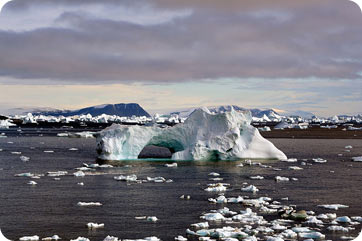If you drop a chunk of solid lead into a pool of liquid lead, the solid chunk sinks to the bottom like -- well, like a chunk of lead. But if you drop a chunk of ice into a glass of water, it bobs to the surface like a cork. The difference makes water a freak of nature. It’s one of the few substances that’s less dense in its solid form than its liquid form.
 Icebergs around Cape York,Greenland. Credit: Mila Zinkova.
Icebergs around Cape York,Greenland. Credit: Mila Zinkova.Pure water is densest at a temperature of 39 degrees Fahrenheit. As it gets warmer, its molecules need more space to spread out. So an even gallon of hot water weighs a bit less than a gallon of cold water.
But water molecules also need more space as the water gets colder. That’s because the chemical bonds between molecules adjust to form a more orderly framework. This framework leaves a little bit of extra room between molecules. So on average, frozen water is only about 92 percent as dense as liquid water. In other words, frozen water weighs a little less than the same volume of liquid water -- hence, ice floats.
That has both fortunate and unfortunate consequences. On the plus side, if you’re a fish in a river, it means that the river freezes from the top. The layer of ice allows the water below it to stay liquid, so you and the other fish don’t freeze. But on the negative side, if you’re in a ship at sea you have to watch out for icebergs.
Also on the negative side, if you put a bottled soft drink in the freezer, don’t leave it for too long. If you do, the water will expand as it freezes -- leaving you with a fractured bottle of pop.

